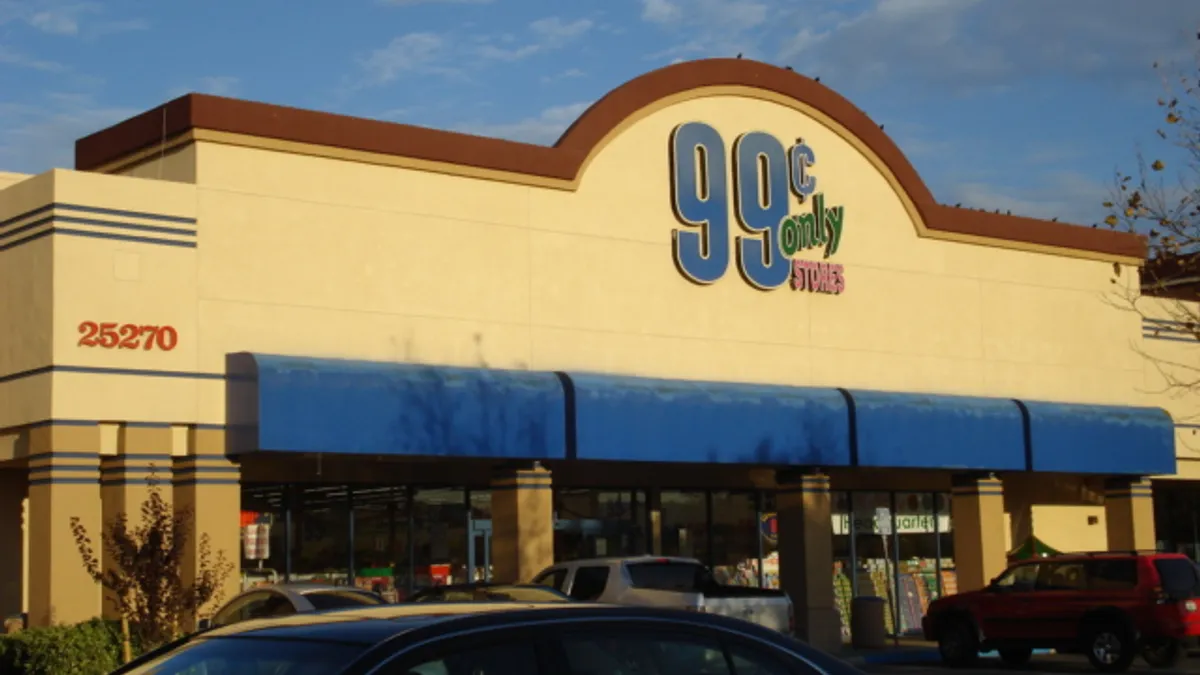Dive Brief:
- Moody's dropped the corporate credit rating of regional discount retailer 99 Cents Only to Caa2 from Caa1, indicating a deepening default risk.
- Along with the rating downgrade, Moody's lowered the outlook for the company from positive to stable.
- "The downgrade reflects the company's much weaker than expected operating performance which has constrained liquidity as we expect free cash flow to remain negative," Moody's Vice President Mickey Chadha said in a statement.
Dive Insight:
99 Cents Only has struggled for years to gain financial footing. It has restructured its debt multiple times out of court. That has kept the company and its creditors out of a bankruptcy scenario, but it has also not fixed the company's underlying financial distress, if it's continuing low ratings are an indication.
Generally strong recent performances by other discounters in the space have not extended to the retailer. "The company has underperformed its peers during the pandemic as it did not get any boost in sales or earnings like many of its peers in the food retailing business did," Chadha said.
And the discounter has some formidable peers to compete against, including the massive — and growing — Dollar General, as well as Dollar Tree (which also includes the Family Dollar Banner). The latter has underperformed next to Dollar General, but is still a behemoth in store count, and profitable. In food, discount grocers such as Aldi have proliferated and put pressure on the entire sector.
99 Cents Only traces its history back to the 1960s, when Dave Gold inherited a small liquor store and tested selling bottles of wine for 99 cents. The first 99 Cents Only store opened in Los Angeles in 1982, with televisions sold at that price point for the first nine customers.
Today the company makes about $2.2. billion, according to Moody's, and operates more than 350 stores located mainly in the Southwestern U.S. That could be a source of some of the retailer's struggles. Moody's analysts noted that their rating reflects in part "the company's small scale, geographic concentration in California and the intense competitive business environment in its core markets."
Analysts also noted the retailer's potential execution risks around 99 Cents Only's strategic initiatives and "cost cuts especially in an intense competitive environment."
Private equity firm Ares Management bought 99 Cents Only in 2011 for a total value of $1.6 billion. Even with deals to reduce some of its debt load, the company's credit metrics have remained at low levels for years.
Despite that, its owners continue to pull cash out of the company. According to Moody's, the retailer paid $20 million in annual cash dividends to its owners based on a preferred equity contribution. Analysts described the dividends as "a drain on cash flow." They also noted that the company owns store and distribution center real estate that could potentially be monetized to raise cash.
Last March, 99 Cents Only tapped Barry Feld, former chief of Cost Plus World Market, to be the retailer's CEO.















